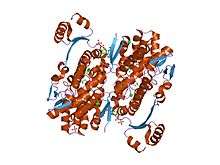HD domain
| HD domain | |||||||||
|---|---|---|---|---|---|---|---|---|---|
 crystal structure of o67745, a hypothetical protein from aquifex aeolicus at 2.0 a resolution. | |||||||||
| Identifiers | |||||||||
| Symbol | HD | ||||||||
| Pfam | PF01966 | ||||||||
| Pfam clan | CL0237 | ||||||||
| InterPro | IPR006674 | ||||||||
| PROSITE | PDOC00924 | ||||||||
| SCOP | 1f62 | ||||||||
| SUPERFAMILY | 1f62 | ||||||||
| CDD | cd00077 | ||||||||
| |||||||||
In molecular biology, the HD domain is a conserved protein domain. It is found in a superfamily of enzymes with a predicted or known phosphohydrolase activity. These enzymes appear to be involved in nucleic acid metabolism, signal transduction and possibly other functions in bacteria, archaea and eukaryotes. The fact that all the highly conserved residues in the HD superfamily are histidines or aspartates suggests that coordination of divalent cations is essential for the activity of these proteins.[1]
References
- ↑ Aravind L, Koonin EV (December 1998). "The HD domain defines a new superfamily of metal-dependent phosphohydrolases". Trends Biochem. Sci. 23 (12): 469–72. PMID 9868367. doi:10.1016/s0968-0004(98)01293-6.
This article incorporates text from the public domain Pfam and InterPro IPR006674
This article is issued from
Wikipedia.
The text is licensed under Creative Commons - Attribution - Sharealike.
Additional terms may apply for the media files.